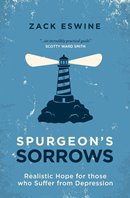Depression is a familiar malady to those in pastoral ministry. Pastors must counsel those who suffer with it in varying degrees and for varying reasons, and they very often must struggle with depression themselves. It may be surprising to learn that Charles Spurgeon was such a minister, but given that, it will be no surprise at all to learn that in his preaching he addressed the awful malady with uncommon perception.
Zack Eswine, lead pastor at Riverside Church in Webster Groves, Missouri, has done a wonderful service in working through the many treatments of depression in Spurgeon’s sermons and writings and distilling it all for us in what we might call “Spurgeon’s pastoral theology of depression.” As you will expect, Spurgeon’s insights and observations are profound (the chapter on suicide is itself worth the price of admission), theologically well-informed, pastorally wise, full of empathy, and … full of Jesus. Spurgeon was a pastor-theologian in the ideal sense, and he still has so much to offer more than a century after his death. This work is overdue! Today Zack talks to us about Spurgeon and his new book.
Books At a Glance (Fred Zaspel):
Welcome back to Books At a Glance! It’s good to have you with us again.
Can we begin with a bit of background? What led you to an interest in this subject of depression? Were there pastoral reasons? Personal? Both, perhaps?
Eswine:
Sadness saturates a great deal of life, you know? As a human being I’ve had to learn this, and as a pastor I’ve had to learn how to walk with others. It turns out that “There is a time to mourn” no matter who we are or how faithful. Therefore, to learn how Jesus walks with us in sadness is already part of what it means to grow as his disciple.
Now, add the reality that sadness can take a dark turn in our lives and never really leave us. And then imagine that this never-leaving-sadness turns mean too. It frightens us, haunts us, lies to us, growls at us, robs promise and joy from us and no amount of bible-quoting will take it away. How do followers of Jesus discern Jesus here when the day ends and the gloom still remains unfixed? Many of us have only a little spiritual maturity with how to be sad much less how to enter our own or others’ depression. So, I’ve needed help to grow, not only so I can get through what Spurgeon called, “the howling desert” myself, but also, so that I could enter such “dark dungeons” with others, and this in a manner that differs from Job’s friends.
Books At a Glance:
Tell us about Spurgeon’s own struggles with depression. Were there specific causes or occasions? Was it long lasting? Recurring? Can you give us a snapshot of Spurgeon’s own experience here?
Eswine:
Spurgeon identified at least three kinds of depression — biological, circumstantial, and spiritual. Though separate, each can merge into a tornado and swirl into a terrible twister in our minds. Spurgeon suffered all three and at times all at once, and this lasted till the end of his life.
As one example, let’s look at Spurgeon’s circumstantial depression, which is sadness turned dark, frightening, and lasting as the result of a traumatic event. As a young man, while Spurgeon preached to thousands, a prankster yelled, “Fire! The stampede of thousands killed or wounded many. The sights and sounds of such senseless death and maiming in the house of worship undid him. The news media seized the opportunity to viscously add their own attack, blaming the young preacher. According to his wife, he nearly lost his sanity. They didn’t know if he would ever preach again. Twenty-five years later, Spurgeon was to preach for a large crowd as a guest. As people crowded toward the front and pressed in, he had what we would call today, a “flashback.” The memory of the earlier trauma returned. It disoriented his whole nervous system making it nearly impossible for him to preach. This example is just one among many in which Spurgeon learned and pointed us to the grace of Jesus.
Books At a Glance:
Was his depression such that it hindered his ministry at times?
Eswine:
Yes. At times, he could not enter the pulpit due to this convergence of physical pain (the gout) and mental darkness (depression). Eventually, he took regular and lengthy winter breaks from his congregational work as pastor, in order to mentally and physically recover and refresh, in Mentone France.
Books At a Glance:
How did these struggles shape Spurgeon’s preaching?
Eswine:
We can get a sense of this great question just by looking at some of Spurgeon’s sermon titles. “The Man of Sorrows,” “Healing for the Wounded,” “A Frail Leaf,” “Elijah Fainting,” “Sweet Stimulants for the Fainting Soul,” “Faintness and Refreshing,” “Weak Hands and Feeble Knees.”
Books At a Glance:
Do we know much about Spurgeon’s pastoral work on a personal level in this regard? Did he have occasion to counsel Christians suffering from depression?
Eswine:
Yes. He said that he felt like a new doctor being handed a new practice. Many wrote to him regularly or sought him out. Even on his sabbaticals to Mentone he found himself meeting with and giving counsel to the despairing who would find their way to him.
Books At a Glance:
There is of course no single piece of counsel that addresses all the various dimensions of depression in specific detail, but is there a theme that runs through Spurgeon’s treatment of this problem? Some recurring counsel that is applicable to all?
Eswine:
Yes. The sorrowing have a savior. Our greatest hope isn’t that we remember the promises of God for us in the midst of the whirlwind, but that he does. His gracious strength is always deeper than the mire that sinks us — he girds us from underneath even though we feel our feet have nothing to touch. Depression often is not the result of our sin — it is as Spurgeon said, a misfortune rather than a fault. With this in mind, it is not only the cross of Christ but the garden of Christ’s betrayal to which we can turn for help. For our savior faced the terror of mental brokenness too. Spurgeon would say that Jesus knew what it was to have depression and in him we find one who doesn’t remain distant telling us to get out of it, but one instead who has been swamped by it to and from there carries us through toward home.
Books At a Glance:
Is there any counsel Spurgeon might give to those who counsel the depressed?
Eswine:
Yes, a great deal. We can’t fix it or cure it, but we can enter it to understand and to listen and to look to Jesus in non-trite ways with those who suffer. Also, we have to maintain an awareness of our own emotional and mental condition. Caring for the despairing can sink our own hearts if we are not careful to maintain our own daily need of gospel promise in community. But most of all, Spurgeon defended the depressed from would be helpers who only added to the pain of the sufferer by their dismissive, quick fix, impatience.
Books At a Glance:
How has this study of Spurgeon affected your own preaching and ministry?
Eswine:
Yes, as a pastor, feeling sad about sad things is no waste of time. Sometimes sadness is the most sane response we can have. Instead of filling the painful silence with words, I’m learning to trust Jesus in the silences not just among the sentences of pastoral care. And as a preacher, I remember that our problem isn’t just that we sin and need Jesus, but that we’ve also been sinned against, and that we also live in a world that by its current nature is fallen. This means that soft hearted, not just hard hearted people are listening for a word from God. Isaiah 50:4 has become my meditation as a pastor/preacher.
“The Sovereign LORD
has given me a well-instructed tongue,
to know the word
that sustains the weary.”

